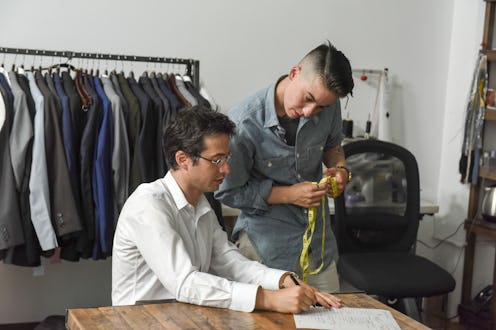Entertainment
What HBO's 'Suited' Means To Me As A Trans Person

The impact of fashion is undeniable. It can affect how we carry ourselves, whether or not we feel body positive, and our comfort level in a social situation. However, style choices and accessibility to empowering clothing impact certain marginalized people more than others, like the trans* and gender nonconforming community, as HBO's Suited, a new documentary produced by Lena Dunham, exemplifies. Often, trans people struggle with finding clothing that fits their bodies properly thanks to the binary nature of most retailers. That's why brands like Bindle and Keep, the custom suit creator for the LGBTQIA+ community highlighted in the documentary, are so incredibly important. And Suited perfectly captures the intense positive emotion associated with wearing a suit that fits properly.
I have struggled for years to find masculine clothing that fits my feminine body properly. Like most masc gender fluid and transmasculine people, I usually resort to shopping in the men's sections of retail stores, often settling for garments that are way too big or don't hug my body in the right places. So when I first saw Suited last week at the HBO premiere, I was deeply moved. As a gender nonconforming fashion writer, I was already aware of the company from my many searches for gender-neutral brands. But seeing the profound impact that Bindle and Keep (as well as a suit that fits) can have on people made me want to immediately schedule a fitting with them more than anything else.
In a panel that took place after the premiere, Suited director Jason Benjamin talked about how capturing the magical moment of seeing the garment fit in the mirror, a moment where many people are seeing their true selves for the first time, was his top priority in the filmmaking process. And those moments, captured time and time again with multiple Bindle and Keep customers, were the essence of the film. Watching each customer look at themselves in their tailor-made suits at the big mirror reveals, you can see years of pain, frustration, dysphoria, and insecurity re-emerge and then melt away as they ultimately cry with joy. These moments moved me deeply, and were something I wish I could experience. But as someone who cannot possibly pass as a masculine person, I've always felt less entitled to these life-affirming moments.
After coming out as genderqueer about a year ago, I've been feeling a lot less strange about my body and identity. But over the past month, I've been asking myself more questions again, no longer feeling at ease in myself. Am I really genderqueer? Why do I think so much about having a penis? Is top surgery something I could go through with? Am I a man?
I've been feeling less and less comfortable wearing women's clothing as of late, and getting dressed every morning has become painful as I constantly grapple with how I can make myself look more masculine (the way I'm most comfortable presenting) with what I've got. One particularly frustrating morning, I desperately attempted to make my AMAB partner's shorts fit me, but to no avail. I'm tired of men's clothing not fitting me, and I'm tired of passing as a woman.
In the winter, I struggle less since pants and layers often helps me get away with a more masculine aesthetic. But come summer, and function has to win over form, as wearing black jeans and hats at the height of summer is nowhere near comfortable. Like so many people in the film iterated, I want clothing that doesn't hide my body, but gives the feminine parts of it a masculine makeover.
But because I'm a shy and anxious person with a tiny frame, I feel that those stereotypical indicators of femininity block me from being entitled to masculinity, and even prevent me from being the man that I'd like to be. I haven't been actively seeking out ways to further affirm my gender identity through gender-neutral or tailor-made clothing like Bindle and Keep because I never thought that it was for me. As much as I want it and as masculine as I feel, I usually don't feel entitled to masculinity, especially when trying to own and proclaim it would make me look like a bad trans person to my peers who pass more easily or have been doing gender-affirming treatments.
But Suited shows me, through the ever-compassionate and inclusive vision of the founders, that I'm entitled to a suit that fits. That no matter how I identify, how I look, or how I sound, I deserve to have my masculinity affirmed with menswear that was actually made for my body. The characters in Suited are not all trans men — there are women and gender nonconforming people too. And none of their experiences were framed as less valuable or valid than the other.
Identities are constantly shifting. I may appear to be very stereotypically feminine, and I don't have plans to remove my breasts anytime soon. But Suited taught me that regardless of where I am on my path to personhood, I deserve to have that magical moment in the mirror, the moment where I finally see the smartly-dressed man that I think I am looking back at me.
Image: JoJo Whilden/HBO